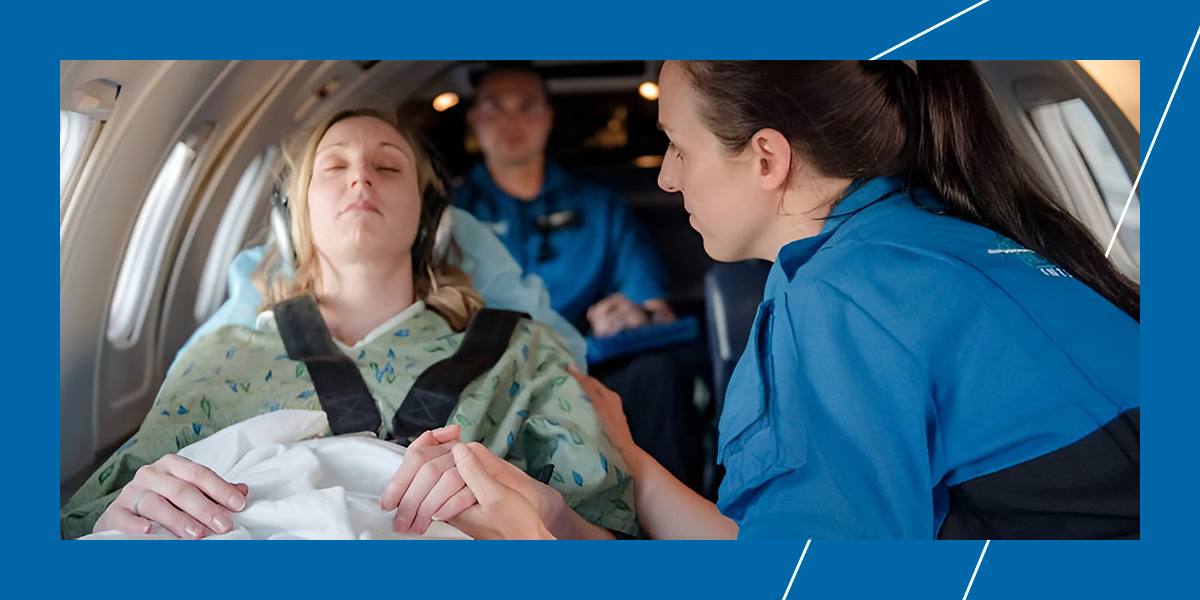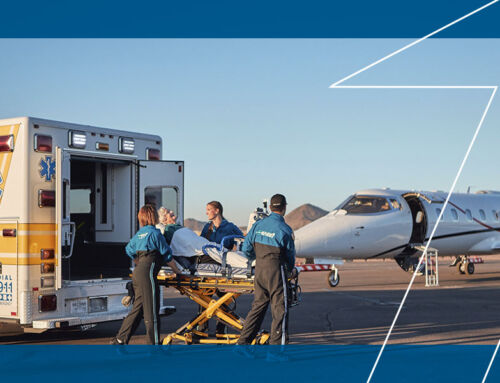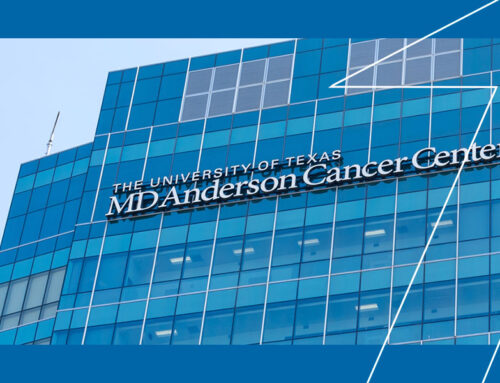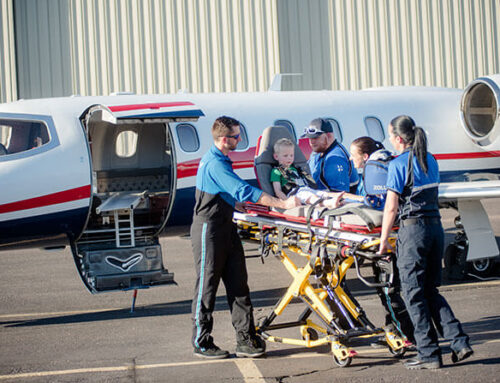Recovering after surgery is a big adjustment, especially since some surgeries can limit your ability to fly commercially — this could be challenging if you have important work or personal trips scheduled.
Air Travel After Surgery
Depending on the type of surgery you had and how recent it was, you may need to find alternative transport arrangements. In some cases, long-range medical transport is the best option to maintain your recovery throughout your journey.
Understanding the requirements and restrictions for flying after surgery is critical for safe travel plans.
Surgeries with Absolute Prohibitions on Commercial Flying
While some procedures may allow you to fly under some circumstances, there are certain surgeries you cannot fly after due to strict medical regulations. Some of these include:
- Eye surgeries: LASIK eye surgery has become very popular recently, with 800,000 Americans receiving this treatment annually. However, this type of procedure — along with other eye surgeries like cataract correction — means you cannot fly, as potential air pressure changes during flights could cause complications.
- Neurosurgery and similar surgeries: Cranial, brain and spinal operations are serious and require at least a week of recovery before you attempt flying commercially.
- Abdominal or gastrointestinal surgeries: If you’ve recently had surgery in your abdominal or intestinal areas, you likely have an incision. These incisions need time to fully heal, which typically takes about six weeks. Hopping on a commercial flight prematurely may not be in the best interest of your healing process.
- Thoracic surgeries: The thoracic region includes your heart, lungs and esophagus. The recovery period depends on how serious the surgery was. For example, a thoracotomy can take around four to six weeks to get back to your daily routine. Furthermore, flying too soon after chest surgery could lead to severe complications, like pneumonia or a collapsed lung.
- Orthopedic surgeries: Many surgeons and airlines agree that you can fly seven to 10 days after orthopedic surgery. However, these same experts state that more serious orthopedic surgeries like hip or knee arthroplasty may take multiple months of waiting before you can fly.
- Ear surgeries: Changes in air pressure can also negatively affect those who have recently had ear surgery, especially if the procedure involves the inner or middle ear. Because your ears are so sensitive to pressure changes, the waiting period after ear surgery is significantly longer than other surgeries. For instance, you likely need to wait at least six weeks after stapes surgery to get on a flight.
Can I Fly After Surgery?
After surgery, you may need long-range medical transport, especially if your surgery was major or recent. For example, some cardiac procedures are minimally invasive, and your surgeon may thus clear you for flying much sooner than if you were to have open heart surgery.
Plastic and dental surgeries may be minor with short recovery times, meaning you can fly soon after receiving treatment. However, this depends on how complex the procedure was and how you are recovering, which is why these treatments require individual assessment to determine the risks of commercial flying.
You should also keep in mind that while the surgery takes its toll on your body, so does the anesthesia. Some people take longer to recover from anesthesia than others. In these cases, your doctor may want to monitor you closely. Even if the procedure was minor, prolonged anesthesia recovery could affect how long after surgery you can fly commercially.
Another significant factor to consider is the risk of blood clots. Flying in the first four to six weeks after your surgery can significantly increase the chances of developing a dangerous clot.
If you are receiving anticoagulant therapy or have a higher risk of blood clots, your doctor may advise that you hold off on flying, even if you are mostly recovered from the procedure. Flying too soon after surgery can be harmful to your health, so it’s always best to talk to your surgeon about it and follow their advice.
Guidelines and Recommendations for Air Travel After Surgery
While each procedure and recovery are different, there are general guidelines for traveling post-operation. Here are some steps you can take to stay safe when flying after surgery:
- Consult your health care provider: Don’t rely on an internet search, anecdotal experience or even how you feel to determine whether you’re ready to fly. If you’re still in the recovery phase of your surgery, talk to your surgeon about any flight plans you may have. They can tell you whether it’s safe to fly and offer tips for looking after yourself on the flight.
- Follow the recommended waiting period: You must follow your doctor’s advice about how long you should wait before boarding a commercial flight. In these situations, it’s better to be extra cautious rather than to take unnecessary risks.
- Understand the recovery process: Ask your surgeon and other health care providers questions before and after the surgery to help you understand what to expect, warning signs to look out for and how to prevent potential issues when flying.
- Follow the post-operative care instructions: When it comes to surgery, taking proper care of yourself after the procedure is vital for a good recovery. You will likely receive in-depth information about care. If your surgeon allows you to fly, they may also give you specific care instructions before, during and after the flight.
The bottom line is that you need to talk to your surgeon or health care provider before booking travel because surgery recovery times vary vastly.
Alternative Transportation Options During Recovery
If you already have a trip booked and can’t postpone it, look into alternative travel options. Traveling via car may be a better choice than flying since you can stop regularly to move around to prevent blood clots. Even if you are traveling by car or other options like train or bus, you should still consult your surgeon since any prolonged sitting could cause health complications.
You may need to travel to a different hospital, in which case an air ambulance is a much better alternative than traditional commercial flights. Air ambulances and other medical air transport services have experienced medical crews that can help you fly safely during recovery.
Fly Safely During Recovery With AirCARE1
You need to prioritize your health and safety throughout your recovery period. Following up with your health care providers and using professional services when traveling are two ways to ensure that flying after a medical procedure goes as smoothly as possible.
If you need to fly after surgery but your health care team hasn’t cleared you for commercial flying yet, look into AirCARE1’s medical air transport as an alternative.
Request a quote to get started today.
Explore Our Other Health Resources:
Top Cancer Care Hospitals In The US
Preventative Healthcare Trends
Linked Sources:
- https://airambulanceone.com/the-most-common-reasons-for-long-range-medical-patient-transports/
- https://healthcare.utah.edu/healthfeed/2019/03/lowdown-lasik
- https://www.healthline.com/health/flying-after-surgery
- https://my.clevelandclinic.org/health/treatments/24767-laparotomy
- https://www.webmd.com/lung-cancer/thoracotomy-procedure
- https://www.ncbi.nlm.nih.gov/pmc/articles/PMC10508977/
- https://www.ncbi.nlm.nih.gov/pmc/articles/PMC10354503/
- https://www.hss.edu/conditions_avoiding-blood-clotting-complications-flying.asp
- https://airambulanceone.com/medical-crew-experience/
- https://airambulanceone.com/request-a-quote/




